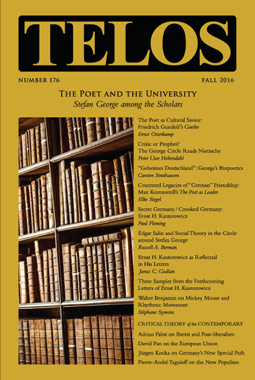Over the last fifty years, the West has witnessed a continuous decline in the quality of the state and its activities, along with a cultural deterioration of the public sphere. All OECD (Organization for Economic Co-operation and Development) countries have also undergone a massive dichotomization of private property ownership: An ever-smaller fraction of the population owns a growing share of all non-public assets. According to some estimates, the richest one percent holds 70 to 80 percent of all global private property, while an increasing number owns nothing and is excluded from decent incomes and the means to live a normal family life.
|
The summer of 2015 may prove to have been a decisive moment in European and global history. The dramatic arrival of hundreds of thousands of people during a relatively short period of time, traveling via the Balkans and Hungary and toward Austria, Germany, Sweden, and other high-income European countries, will be forever remembered by those who witnessed these events as they unfolded. The swift arrival of 1.3 million asylum seekers, predominantly young men from the hotspots of global conflicts, like Syria, Afghanistan, and Iraq, took the political systems of several European countries, and the European Union itself, by surprise. The following think-piece by an active participant in the European public discussion on immigration policy, written well before the European parliamentary elections of May 29, 2019, is understood as a contribution to the European and international political debate and not (so much) as a “pure” scholarly article. It begins with a stark prognosis: the earthquake-like outcome of these elections will strengthen the far-right political parties all over Europe, dramatically weakening the European center and left, and breaking down the “welcome culture” initiated by German chancellor Angela Merkel’s famous statement of late summer 2015—”We can do this” (“Wir schaffen das”)—which signaled a temporary and short-lived “air superiority” for multiculturalism, cultural pluralism, and the welcoming of masses of refugees from the Middle East and North. One of the main reasons for the predictable decline of the Left on the European continent is, in my opinion, its inability to find credible solutions to the problems of immigration and integration. Among the discouraging quandaries that the European Union has had to face in recent years, no one could have imagined that the United Kingdom and the United States, our historical, crucial allies, would turn their back on the EU, thus leaving it exposed to the global influence to Russia, Turkey, and Iran, not exactly friends of our open societies and polity. It would have been equally impossible to predict that so many supposedly enlightened, tolerant, and democratic European citizens would rally around xenophobic and anti-Semitic political parties while reviving the most obtuse and primitive ethnocentrism. All these ills, and most of all of Brexit and its aftermath, were interpreted by many as a fatal blow to the EU, in combination with other indicators that seemed to point to a general design failure of its unifying project. Nevertheless, many reliable commentators have expressed faith that the EU, at long last, would react to this long-standing issue. President Trump’s executive order on refugees has been widely, and rightly, criticized on policy and moral grounds. But while criticism of the executive order is indeed proper and necessary, one aspect of the new policy, namely, the prioritization of claims of religious persecution by religious minorities in refugee applications, which has received wide criticism, should in fact be hardly controversial. Critics of the measure have rejected it on both moral grounds—it discriminates based on one’s faith, as well as on practical ones—the perception of such bias toward Christians by the United States would impact the U.S. negatively and may harm those very same Christian communities in the region, who will be viewed as Western agents. These concerns are of course hardly new. In addition to exploring the history and legacy of the George Circle, Telos 176 (Fall 2016) features a special section of topical writing, introduced here by Russell A. Berman, that continues our ongoing commitment to setting forth a critical theory of the contemporary. Telos 176 is now available for purchase in our store. |
||||
|
Telos Press Publishing · PO Box 811 · Candor, NY 13743 · Phone: 212-228-6479 Privacy Policy · Data Protection Copyright © 2025 Telos Press Publishing · All Rights Reserved |
||||



